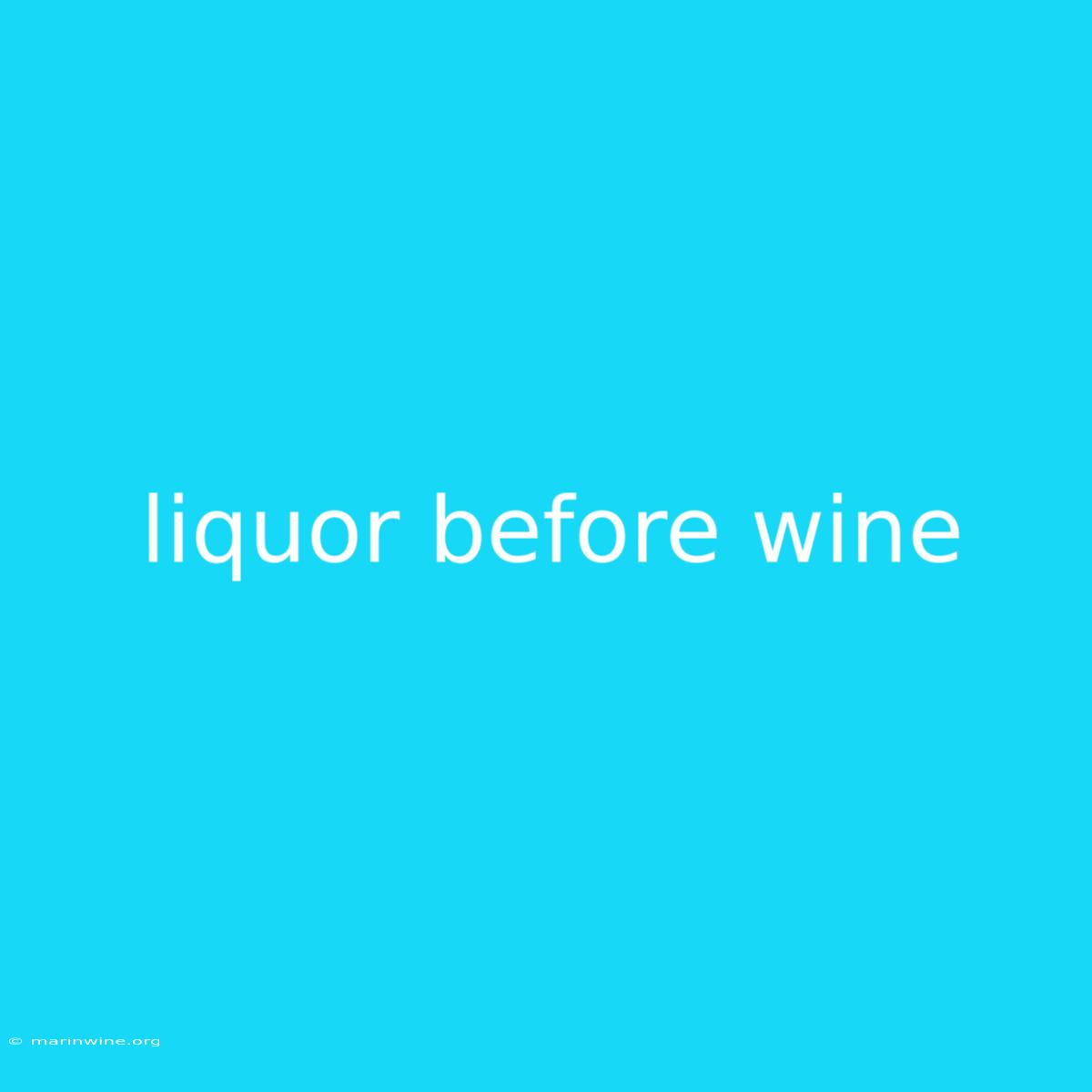Liquor Before Wine: Unraveling the Truth Behind the Old Saying
Have you ever heard the saying, "Liquor before wine, you'll feel fine; wine before liquor, you'll be a sicker"? This age-old adage has been passed down through generations, promising a smooth sailing night of revelry if you stick to its rules. But is there any truth to this claim, or is it just an old wives' tale?
Why It Matters: Understanding the potential effects of different alcoholic beverages on your body is vital for responsible drinking and ensuring a pleasant and safe experience. While the exact science behind "liquor before wine" is complex and debatable, exploring its origins and potential implications can provide valuable insights into the art of enjoying alcoholic beverages responsibly.
Key Takeaways of Liquor Before Wine:
| Takeaway | Explanation |
|---|---|
| No Scientific Evidence: There's no concrete scientific evidence to support the "liquor before wine" adage. | The saying likely stems from anecdotal observations and may not be universally applicable. |
| Impact of Alcohol Type: Different alcoholic beverages have varying alcohol content and composition, influencing their effects on your body. | Understanding the differences between liquor and wine is essential for informed decision-making. |
| Individual Tolerance: Alcohol tolerance varies significantly from person to person. | What works for one person may not be suitable for another, emphasizing the importance of personal responsibility. |
Liquor Before Wine: A Deeper Dive
Understanding the Different Effects:
- Liquor: Typically refers to distilled spirits like whiskey, vodka, and gin, generally containing higher alcohol content. They are absorbed into the bloodstream faster, leading to a more rapid onset of intoxication.
- Wine: Generally fermented beverages with lower alcohol content than liquor. They contain various compounds like tannins and antioxidants, which can impact their absorption and effects on the body.
The Myth and Reality:
The "liquor before wine" saying likely originates from the perception that drinking lighter beverages like wine after stronger ones might lead to a more gradual and less intense hangover. However, this is highly subjective and depends on factors like individual metabolism, alcohol tolerance, and the overall quantity consumed.
The Role of Metabolism:
Your body's metabolism plays a crucial role in how alcohol is processed. Some people might experience a faster onset of intoxication with liquor, while others might be more sensitive to wine's effects. This variation in individual response makes it difficult to establish universal rules for drinking order.
Factors to Consider:
- Alcohol Content: Higher alcohol content in liquor can lead to a faster absorption rate, causing a more intense and rapid intoxication.
- Drinking Habits: Regular drinkers might have a higher tolerance for alcohol, whereas occasional drinkers might experience more pronounced effects.
- Food Consumption: Eating while drinking can slow down alcohol absorption, potentially mitigating some of its effects.
The Bottom Line:
While the "liquor before wine" saying is a popular adage, there's no scientific evidence to support its claims. The effects of alcohol are highly individual and influenced by various factors. The best approach is to drink responsibly, be mindful of your limits, and consume alcoholic beverages in moderation.
FAQ:
Q: Does the "liquor before wine" saying really work?
A: There's no scientific evidence to support this saying. The effects of alcohol are highly subjective and vary depending on several factors.
Q: Can I avoid a hangover if I follow the "liquor before wine" rule?
A: No, following this rule won't guarantee a hangover-free experience. Hangovers are mainly caused by dehydration and the body's response to alcohol breakdown.
Q: Why do people believe this saying?
A: The saying might stem from anecdotal experiences and cultural traditions. It could also be based on the idea that switching to lighter drinks after stronger ones might feel more comfortable.
Q: What are some tips for responsible drinking?
A: Stay hydrated, eat while drinking, pace yourself, and know your limits. Don't drink and drive, and always prioritize your safety and well-being.
Q: Is it safer to drink wine before liquor?
A: There's no definitive answer to this question. The safest approach is to drink responsibly, regardless of the order of beverages.
Tips for Enjoying Alcoholic Beverages:
- Hydrate: Drink plenty of water throughout the night.
- Eat while drinking: Food helps slow down alcohol absorption.
- Pace yourself: Don't rush your drinks, and take breaks between them.
- Know your limits: Be aware of your tolerance and stick to it.
- Choose your drinks wisely: Consider the alcohol content and your preferences.
- Avoid mixing drinks excessively: Mixing different types of alcohol can increase the risk of intoxication.
Summary of Liquor Before Wine:
The "liquor before wine" saying is a common myth without scientific backing. Alcohol effects are highly individual and influenced by various factors. The best approach is to drink responsibly, prioritize your health, and enjoy alcoholic beverages in moderation.
Closing Message: While the "liquor before wine" rule might be passed down through generations, it's important to rely on evidence-based information and personal responsibility when it comes to enjoying alcoholic beverages. By understanding the potential effects of alcohol and prioritizing your safety and well-being, you can ensure a fun and memorable experience.

